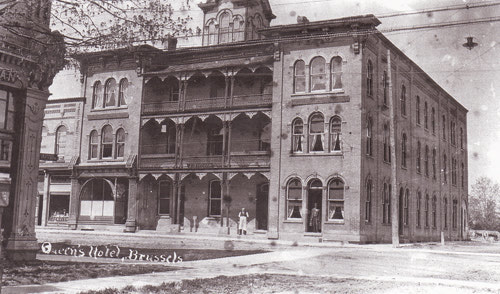Brussels once had five hotels, now none
Like most area municipalities, hotels were in abundance in Brussels during its early years. A story in The London Free Press of Feb. 15, 1964, by Leon Cantelon, indicated that by 1863, what was then known as Ainleyville, had two hotels, The British Hotel, owned by Simon Powell, The North American Hotel, owned by William Armstrong and one saloon, The Dingle Saloon, owned by John Graham. The 1879 Belden Atlas listed five hotels among the assets of the young village.
The Revere House , a wooden building, was situated just south of the railroad tracks to the west of Turnberry St. The Central Hotel was situated on the east side of Main St in what is now the liquor store parking lot. The Tecumseh Hotel was owned by Wm. Vanstone, one of the first settlers to what was then Ainleyville in 1859. He was also the owner of the chopping mill, flour mill and saw mill, where the Logan Mill presently stands.
Cited in the Belden Atlas as "one of the finest buildings we have ever seen in a place of corresponding size" was the once-splendid Queen's Hotel, which, its splendour having faded, was demolished in 1986 to make way for what is now the Foodland. The following description is taken from that 1879 historical atlas.
"The main facade (of the Queen's Hotel) shows a chief front and two projecting wings, the interval being filled by a handsome piazza of equal height with the main building , which is three stories and a basement; the centre is topped by a lofty and highly ornamental rectangular tower, surmounted by a cupola whose top is protected by a handsome iron railing.
The architecture of the rectangle is broken at intervals by dormers which add to the general effect, making it as a whole, one of the finest commercial buildings anywhere to be found."
Sadly, by the time the building was demolished most of its former glory was long gone. The brick had been painted white and the paint was flaking. The hotel had been vandalized. The original balconies were gone, along with the cupola. One wing had been covered with clapboard.
The village of Brussels picked up the property at a tax sale and, concerned with the safety of people in the area, sought a buyer to redevelop the main steet location.
Demolition began in March of 1986 to make room for a new EMA supermarket. Total Demolition of Brussels had the contract to remove the building, bricks and other materials to be recycled into other building projects.
One piece of the hotel which remains alive is the front of the old sample room. Brussels native and architect John Rutledge, had remembered that under the boarded up front of the hotel was an ornate storefront of what used to be a pool hall and hamburger stand operated by his aunt, Maggie Rutledge. He asked for the boards to be removed so he could get a picture, then was so impressed he contacted the Huron County Museum curator, who purchased it and used it in a streetscape reproduction at the museum.
When Brussels celebrated its centennial in 1972, the last of the two remaining hotels was then called The New American Hotel, the "new" having been added years earlier. This hotel, later renamed the Brussels Inn remained open for many years after the Queen's closed. When it closed, for a time there was fear that it would meet the same fate as vandals quickly attacked and started its rapid decline. It was, however, saved in the late '80s by June Warwick. Then when Joe and Helga Springer of Waterloo purchased it in 1992 they renamed it the Brussels Country Inn. They remodelled the upstairs transforming 17 rooms and one restroom into three rooms and three suites with private baths.
Downstairs required primarily cosmetic work, with the end result being an elegant updating and new life for a part of Brussels history, a reminder of the once glorious structures that thrived in the bustling new community of the 1800s.
The couple ran the Inn successfully for several years before selling it. The new owners eventually abandoned the building.
Fencing went up around it in 2006, as chief building official Paul Josling said the building was no longer safe to enter. In January 2008 the building was demolished ending the era of hotels in Brussels.


